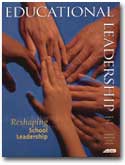More Money for Education
Robert Slavin's "Can Education Reduce Social Inequity?" (December 1997/January 1998) is missing just one thing: the clarion call for more money for education.
The truth he speaks—the unacceptability of continuing the status quo, where children from lower socioeconomic groups continue to fall farther behind—is accepted by nearly all educators and many government leaders.
Slavin reports on the Abeccedarian Project, Reading Recovery, and his own funded project Success for All. He goes on to say that the Abeccedarian Project is too expensive under current conditions. As a nation we cannot afford to lose generation after generation of children to inadequate education programs when we know what works and merely have to generate the public will to pay for it.
I plead with researchers to speak out for the funding of the programs proven worthy by research. We've had enough of research that only proves what we already know. The time to implement this knowledge is here.
—Peter D. Rosenstein, Executive Director, National Association for Gifted Children, Washington, D.C.
Feature the National Board
Although your issue on "Strengthening the Teaching Profession" (February 1998) featured many excellent programs for the advancement of our profession, I was astounded to find that the National Board for Professional Teaching Standards was not mentioned. This outstanding organization has established rigorous standards for what accomplished teachers should know and be able to do. Its assessment and certification of teachers on a voluntary basis is becoming a major catalyst for the improvement of teaching and learning. I hope the National Board and its certification process will be the topic of a future issue.
—Tracy Decker, National Board Certified Teacher, Bloomington, Minnesota
The Average Salary Was What?
I read Andrew S. Latham's Research Link on "Teacher Satisfaction" (February 1998) with great interest until I arrived at the data from a 1991 study by Lee, Dedrick, and Smith. It said, "Although public school teachers had a slightly smaller average class size (35 versus 38 students) and a much higher salary ($22,226 versus $14,796), Catholic school teachers were significantly more likely to report feeling efficacious and satisfied."
When was this study done? 1991! No way! Those class sizes hearken back to the mid-60s. Those average salaries go back quite a few years, too.
I have been in education for 43 years and have worked in six states. My average class size was about 42 in 1956. I remember when the average teacher salary was around $22,000, but that was perhaps 20 years ago. Unless this study was done in some poorer state than I have worked in, the data cannot be correct.
—Robert J. Gerardi, Superintendent, School Administrative Unit #64, Union, New Hampshire
Author's note: Thanks for the careful reading. The 35 versus 38 students is wrong—my inexplicable misinterpretation of the chart that lists those numbers as "percent of students taught above school average." The authors make no mention of class size in this study. In addition, you are right that the salary data are old. Although the authors wrote the article in 1991, they used survey data from 1983-84. Mea culpa for these mistakes.
On Skeptical Questions
Carolyn Pool's Perspectives, "Centuries of Learning" (November 1997), reminded me that the scoffers of human advancement—Neil Postman and company—have been around with skeptical questions since the Big Bang .
Wasn't it in ancient Sumer, when the king looked at the new writing on tablets and said to the author: "So, whose pockets will this line? The tablet makers, that's who!"
Even Socrates was wary of newfangled writing. "Who will need to memorize our glorious history when it is all written down? A good memory will no longer be a necessity."
Every "high-tech" advancement had its Luddites. Postman worries about "face-to-face instruction" disappearing. Would he return to the teacher on a pedestal, talking down to students?
Postman is skeptical of "solutions" handed down by government or commercial interests. Yet, commercial advantage is a reasonable engine to spawn change. Rather than protect children from information, we should help them learn how to evaluate and use it.
—Howard Kane, Forest Hills, New York
Censor Name-Calling
I was interested in the article on peer pressure and name-calling entitled "Boys Call Me Cow" (October 1997), but the language used offended me. As a professional educator, I have heard adolescents use these epithets, but I did not expect these words in a professional journal. This is the language that we are urging our legislators to censor from music teens listen to. I hope you will be more vigilant in censoring such language on your pages.
—Garry Lee Newton, Americus, Georgia
Merci Pour Votre Attention
I am concerned about ASCD's failure to recognize foreign language as part of the general education enterprise. For example, in the theme description for February 1999, you list a number of subjects that will be enhanced by "Integrating Technology into the Curriculum." Foreign language is not one of them. I see a pattern of a subject area being ignored. ASCD fails to send messages of inclusion of foreign language in the general curriculum.
—Kathleen M. Riordan, Director of Foreign Language, The Public Schools of Springfield, Massachusetts
